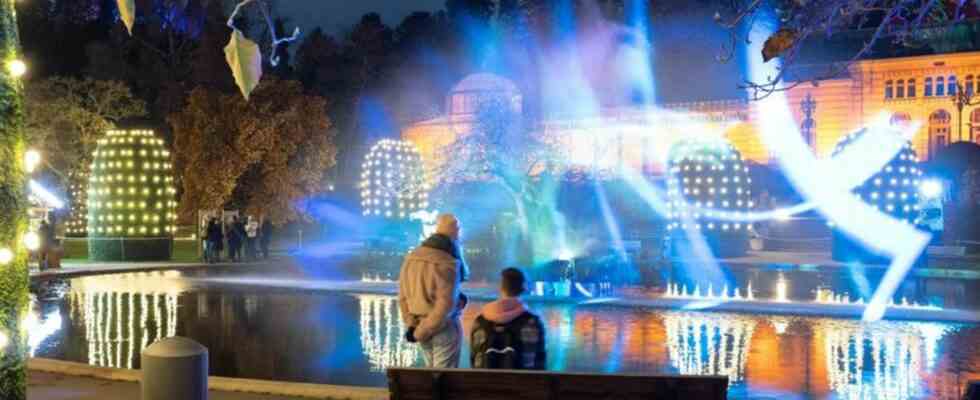Christmas Garden
Christmas time: Gardens of lights defy the energy crisis
Numerous lamps illuminate the Wilhelma zoological and botanical garden in Stuttgart. photo
© Bernd Weißbrod/dpa
Instagrammable kitsch: Festively lit parks for around 20 euros entry have become a trend destination in some German cities at Christmas time. Will this also work during the energy crisis?
Parks with artistic light installations have become a trend in Advent. Despite the energy crisis, the ten “Christmas Gardens” in Germany from Berlin to Lake Constance also want to take place in 2022 until further notice. “We have done a great deal to reduce energy consumption as much as possible,” emphasized Sebastian Stein, the managing director of the organizing company. The light sources were “converted to efficient LED lights, the path lighting reduced to a safety minimum, admission times shortened”. There will be no ice rinks.
Hundreds of thousands visited the evening excursion destinations during the Christmas weeks of the last few years for an entrance fee of around 20 to 30 euros. There are two Christmas gardens in Berlin, as well as in Frankfurt/Main, Dresden, Cologne, Münster, Hanover, Koblenz, Stuttgart and on the island of Mainau in Lake Constance. They want to open mid-November to mid-January. “When considering all locations, we calculate a national average of 30 percent electricity savings,” explained Stein.
Energy consumption as high as watching Netflix
A Christmas Garden consumes an average of 0.56 kilowatt hours (kwh) of electricity per visitor, Stein calculated. “The luminous flux consumption is therefore about as much electricity as is required, for example, to use a streaming service such as Netflix for one and a half hours, or to put a standard coffee filter machine into operation once,” says Stein. In this debate, one should also not forget that the visitors who stay in the Christmas Garden do not do this at the same time, nor do other activities at home, which almost all consume electricity in the dark season.
The operators see their light parks “as a more atmospheric alternative to all the hustle and bustle that prevails at most Christmas markets”. In contrast to densely packed Christmas markets, you are invited to take a deep breath in the Christmas idyll. The Christmas Gardens are “around two kilometers long circular routes, on which the public is invited to pause and marvel”. In addition to the audiovisual experience, there will also be food and drink.
New locations abroad
DEAG Deutsche Entertainment AG’s first Christmas Garden in 2016 was in the Berlin Botanical Garden. Further locations were added due to the public response: in 2018 it was Pillnitz Castle and Park in Dresden and the Wilhelma in Stuttgart, in 2019 the Allwetterzoo Münster and the Tierpark Berlin, in 2021 Frankfurt, Hanover, Koblenz, Cologne and the Bodensee island of Mainau.
In 2022, Christmas-illuminated parks will also premiere in Chorzów in Poland and the Italian capital Rome.
In 2021, the event format was presented at 18 locations in four countries, including Barcelona, Valencia, London and Paris: a total of around 1.9 million people visited the gardens.

